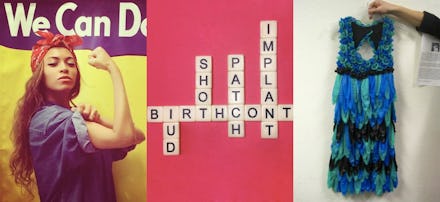This Is What Sex Ed Would Look Like If It Took Place Entirely on Social Media

If there's going to be a sexual revolution when it comes to women's health, it's probably going to start with a Planned Parenthood Instagram or Facebook post. And there's a good chance it will somehow involve Beyoncé.
Planned Parenthood's social media accounts, which were nominated last week for a Webby Award for education and discovery, are well aware of where young people are really getting their sex ed.
To that end, about three years ago, Planned Parenthood focused their social media strategy on sexual health and wellness, separating out their more political messages onto special "Action" accounts. Now, Planned Parenthood posts offbeat IUD-inspired bike racks, punchy factoids about #ovulation and #Easter, and photos of what women really look like wearing birth control patches for over 167,000 Facebook fans, 7,900 Instagram followers and 32,700 Twitter followers.
The accounts are still growing, but it's the uniquely irreverent yet accurate content that makes them stand out. The Facebook page has an audience that's 77% women ages 18 to 34 on Facebook, and the Twitter following is 69% female, the organization told Mic. Planned Parenthood serves this audience sexual health in a cheeky, trusted tone that's changing the nature of what we know sex ed to be.
Getting us where we are: "We're not trying to replace talking to a parent or teacher, but we're trying to supplement it and reach people where they are," Amy Bryant, managing editor of Planned Parenthood Online at Planned Parenthood Federation of America, told Mic.
"It's all about providing accurate information and non judgmental information. It's important that the information also be understandable."
For Planned Parenthood, which also offers medically accurate sexual health information on its website, in clinics and in one-on-one chats with health care providers, leveraging social media is crucial. A 2011 survey on sexual health in the digital age found that 89% of young people use the Internet as their primary resource to learn about all things sex, including birth control, menstruation and pregnancy STDs.
But getting the information out there can be a challenge. Sexual health organizations may find themselves censored when platforms like Facebook and Twitter miscategorize health information as explicit "sexual content" and block it. Bedsider, a network run by the National Campaign to Prevent Teen and Unplanned Pregnancy, was restricted on Twitter after posting an article about condom safety, the Atlantic reported in March. They were one of mutiple sexual health organizations that have been censored, the Atlantic found.
Planned Parenthood, fortunately, has never been banned, but they're aware of the current dilemma. "The policies of these platforms should really include sexual health information and see it as different as sexually explicit material," Julia Scheinbeim, manager of education and Publications at Planned Parenthood Federation of America, told Mic.
Embracing celebs doesn't hurt: Planned Parenthood manages to avoid bans with content that skews more fun than racy, focusing on frank conversations about sex with a splash of entertainment. Laverne Cox, Beyoncé and Lena Dunham are frequent faces on the feeds. The organization is selective about the personalities they feature on their platforms because, Bryant said, "Young people are smart, and they crave authenticity."
Part of that strategy is letting the sex lessons come to them. A prime example came in 2012, when Zac Efron accidentally dropped a condom on the red carpet during The Lorax premiere. Efron later quipped on Today that "better being safe than sorry" was a great message to add to the film.
"That was a perfect opportunity for us to say, 'Hey, check it out, Zac Efron uses condoms. You should too.'" Bryant said. "But had he instead recorded a message for us telling people to use condoms it wouldn't have been nearly as effective. Our audience is much too smart for that."
Accurate entertainment: Planned Parenthood also knows each platform can serve a different need to a different group. That means knowing what people want to see even if they won't speak up, like with topics such as masturbation. Teens may not comment on the topic publicly, Bryant said, but anything on the subject will get a a lot of clicks. Other topics, such as the group's Get Yourself Tested campaign, are perfect for open conversation, often hosted in personalized Q&As on their Tumblr page.
Social media has its limits. But even if Planned Parenthood can't provide the most comprehensive information on a Tumblr reblog or Facebook post, they will at least know they've tried to resonate with a younger generation in the most streamlined way they can.
"Nobody's going to learn all they need to know about how to put on a condom," Bryant said of their Instagram account. "But they might learn a little something."